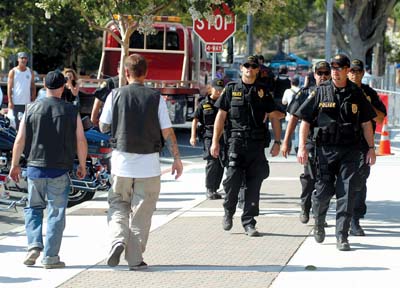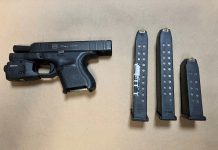
Miller attributes $38,000 increase to state personnel used in
command center
HOLLISTER
Hollister Police Chief Jeff Miller estimated that the cost of law enforcement at the 2008 rally is around $38,000 more than in 2007 – but he contends the money was well spent.
Miller told the Free Lance that the “bulk of the increase” was due to California Department of Justice personnel who worked out of the command center. He also noted how the police department this year took on some duties formerly overseen by the county sheriff’s office, also contributing to the extra price tag.
Miller said the command center in particular helped the effort in 2008, the cost of which rose from $321,000 in 2007 to $359,000 this year. Those extra costs add to the city’s deficit on the rally as Hollister is set to owe $119,000 for event security after licensing revenue, intended to offset that expense, is added into the formula. That doesn’t include whatever the city might owe for potential losses on merchandise revenue, which stand at nearly $100,000.
“That center is a big part of the reason why we had a reduced number of incidents,” said Miller, adding that there was a sizable increase in Hells Angels partying with Nortenos this year.
Miller noted how there were shots fired at one such party during rally weekend and that the command center enabled a speedy response, but he underscored the center’s function of keeping incidents from reaching that level in the first place. In that instance, the suspected shooter or shooters fled before officers arrived.
“There had just been a motorcycle gang shooting in Los Banos so you know anything can happen,” he continued, referring to a confrontation between Hells Angels and Mongols – rival gangs – ending with six shots fired from a handgun and a victim being stabbed.
San Benito County Sheriff Curtis Hill, who noted that his office participated minimally in the rally this year, agreed that gangs are a big concern and can add to the costs.
“In a biker rally you have a small percentage of individuals there specifically to commit crimes – selling guns and narcotics, prostitution, money laundering,” Hill said. “We passed on our intel responsibilities to the city, but in the past, we would get 75 to 100 plainclothes officers from local, state and national agencies that would work to watch that percentage.”









